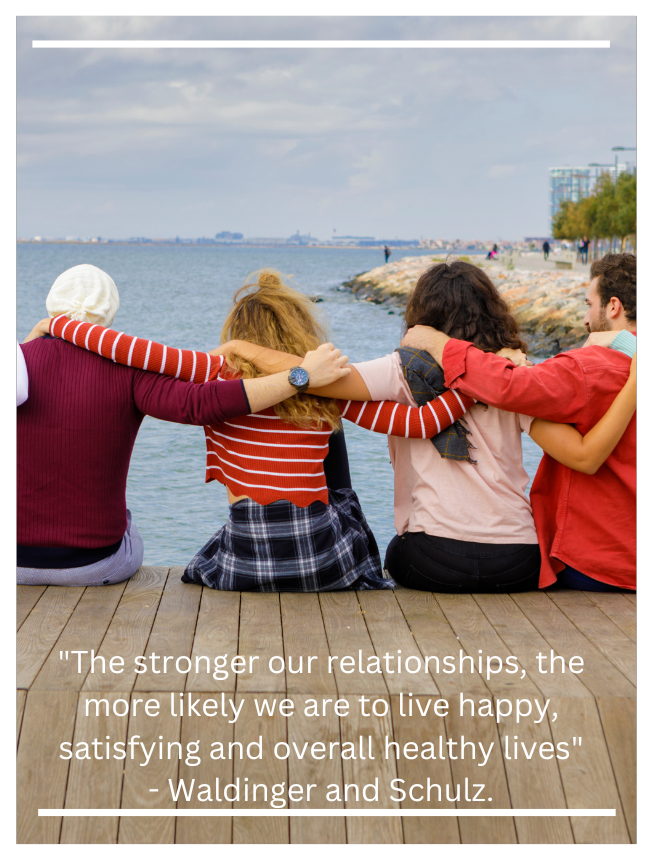Newsletter – The Summer Holiday Series – The Benefits of Relationships
Self Care for Parents Week Two: Invest in Your Relationships
I’ve recently been reading an amazing book. The Good Life: Lessons from the World’s Longest Study on Happiness by Robert Waldinger and Marc Schlutz summarises the findings of Harvard Study of Adult Development. This is a research study which has been following a group of people (and now many of their children) for over 80 years to try to reveal the true components of a happy, fulfilled life.
Their findings are clear. The most significant factor in a experiencing a rich and happy life is the quality of our relationships.
In this article I’ll be thinking about how this works and you might want to do about it.

Social Support and Anxiety Reduction:
Numerous studies have consistently demonstrated the positive influence of social support on reducing anxiety levels. Strong and supportive relationships provide individuals with a sense of belonging, acceptance, and emotional comfort. All of which contribute to a decrease in anxiety symptoms.
Having someone to confide in and seek guidance from can alleviate stress and provide reassurance during challenging times.
The Buffering Effect of Relationships:
Healthy relationships act as buffers against the negative impact of stress on mental health. When individuals face stressful situations having reliable and supportive relationships can mitigate the harmful effects on anxiety levels. Supportive partners, friends, or family members can provide emotional support, practical assistance, and a fresh perspective, helping individuals cope with anxiety more effectively.
Intimacy and Emotional Connection:
Intimate relationships, such as close friendships or romantic partnerships, offer unique benefits for mental health. These relationships provide a safe space for emotional expression, vulnerability, and sharing of life experiences. The deep emotional connection fosters feelings of security and enhances overall well-being, reducing anxiety symptoms and promoting mental resilience.
Social Interaction and Dopamine Release:
Engaging in positive social interactions triggers the release of dopamine in the brain, a neurotransmitter associated with pleasure and reward. Meaningful relationships provide opportunities for social engagement, laughter, and shared experiences, promoting the release of dopamine and creating a sense of happiness and contentment. This, in turn, can alleviate anxiety and improve overall mental health.
Empathy and Emotional Regulation:
Healthy relationships are characterized by empathy and emotional regulation. When individuals feel understood and validated by their loved ones, it enhances their ability to regulate emotions effectively. This is particularly important in managing anxiety, as emotional regulation skills help individuals cope with stressors, prevent emotional overload, and maintain better mental well-being.
Supportive Relationships and Coping Strategies:
Strong relationships can facilitate the development and implementation of effective coping strategies to manage anxiety. Supportive partners, friends, or family members can provide guidance, encouragement, and practical advice on coping techniques.
They may also engage in joint activities that promote relaxation and stress reduction, such as exercise, meditation, or hobbies. These coping strategies, when practiced together, can significantly enhance mental health and reduce anxiety symptoms.

So What Can You Do About It?
In our busy lives we can struggle to really prioritise our relationships. Not making time to catch up with those who are important to us but also not giving our attention or really connecting with those we do see regularly.
Relationships shift through several stages when you become a parent. Spending time with those with similar age children feels very important when children are young but those relationships can drift once children maternity leave ends or the children start school. For some relationships with other school parents become important but again these can be hard to maintain if the children’s relationships shift.
We only have finite time so when we prioritise new relationship older relationships can inevitably drift. How do we make sure that the relationships that we prioritise in terms of time and emotional energy are the ones which provide us the emotional benefits above. The Good Life book has some excellent tools for auditing relationships; thinking about our relationships and what we get from them and making plans for how we can make improvements.
And what about how we interact when we are together? Are we connecting or are we distracted? Checking social media, scrolling, taking calls from work will all impact on how fulfilling the interactions are. When we don’t give our full attention it is felt by others and the connection is impacted.
Really understanding the extent to which our relationships support our health and wellbeing is a great starting point to make changes. Start with having a think about one step you can make today to reconnect.
Have a great week
Jo
Jo Atkinson – NLP4kids Therapist and Parenting Coach

Leave a Reply